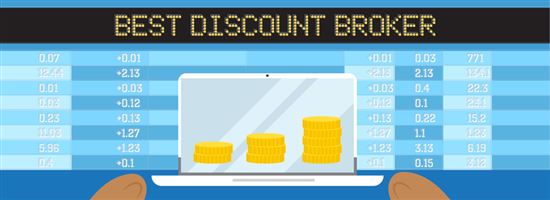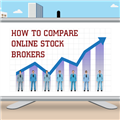The Best Discount Broker
The best online broker offers low fees, great customer service, and smart research tools. Find the best discount brokerage to consider.
 |
| © CreditDonkey |
- Ally Invest (formerly TradeKing)
- TD Ameritrade
- E*TRADE
- Fidelity
- Merrill Edge
- Charles Schwab
- Interactive Brokers
Discount brokers charge as little as $0 for online U.S. stock trades. Compare that to the $100+ that many full-service brokers charge. It seems like a no-brainer choice to choose the discount broker. But, you must know how to pick the right one.
Because trading online is a self-directed practice, you need the right broker backing you up. Read our in-depth guide on our choices for the top discount brokers today.
Deposit $100 and Get $10 from eToro USA LLC
- Sign up for an eToro account
- Deposit $100
What Is a Discount Broker?
 |
First, let's look at the definition of a discount broker.
As the name suggests, discount brokers cost much less than a full-service broker. But, their services are much more limited. Basically, they execute your orders to buy or sell your investments. They do not provide advice. In other words, you won't speak to a person when you execute your trades. The upside? You won't have someone trying to upsell you or get you to invest in things you don't want to invest in.
However, this does not mean you don't get support. Many discount brokers do offer in-person customer service for those times when you are better off talking to someone. Plus, many of them offer online resources and tools. Some even have tutorials or mock trading platforms to help you get the hang of investing.
The bottom line is a discount broker costs you much less money per trade. You won't have the steep commissions that full-service brokers charge. What this means is more cash in your pocket and the opportunity to make more trades.
If you are considering opening a brokerage account, you must check out these promotions.
Why Use a Discount Broker
 |
So why would you choose a discount broker over a full-service broker? The main reason is the cost. But here we will break down who would do better with a full-service broker and who could get by with a discount broker.
Who Needs a Full-Service Broker?
If you answer "yes" to the following questions, you may be better off with a full-service broker:
- Do you have a large number of large investments?
- Do you not have time to manage your portfolio effectively?
- Do you not have the desire nor the know-how to handle your portfolio?
- Can you afford high commission fees?
If you answered "yes" to each of these questions, a full-service broker might be the best option. Expect to pay between $150 and $200 for each trade, though.
Who Needs a Discount Broker?
 |
Typically, the "average" investor does just fine with a discount broker. Answer the following questions to see if you qualify:
- Do you want to save money on each trade made?
- Do you like to be in control of your investments?
- Do you not want to be bothered with upselling or pressure to take other investments?
- Do you make frequent trades?
If you answered "yes" to these questions, you may fare just fine with a discount broker.
What to Look for in a Discount Broker
 |
Once you decide a discount broker is the way to go, you still have many decisions you must make. A quick search online will give you many options. Before you get overwhelmed, consider the most important factors:
- Cost: This probably goes without saying. You want a broker that you can afford, but don't jump at the cheapest broker just yet. Consider all of the fees, not just the advertised ones. You might find a broker that advertises super low commissions, but doesn't readily advertise the other fees. Call them hidden fees or extra fees; the bottom line is that they cost you more than what's advertised. Ask about annual fees, maintenance fees, inactivity fees, and transfer fees.
- Minimum deposit/balance: Some brokers require a minimum deposit to open the account. Others don't have a minimum. Yet others require a minimum average balance over the life of the account. Determine what you can afford to keep in the account if choosing accounts with a minimum requirement higher than $0.
- Customer service: The level of customer service you want is a personal decision. Take a trial run on any broker's website that you are considering. Check out the support they have readily available on their website. But you should also email and call them with questions. See how long it takes to get an answer. This can help you decide which broker provides the level of support you need.
- Tools: Online brokers offer a varying amount of tools. They include retirement calculators, market analysis, comparison charts, and research tools. Consider whether you need in-depth research tools or if you are a more basic investor. There are online brokers for both types of investors. Knowing what will help you be successful will help the decision.
Best Discount Broker
 |
Here are the top discount brokers according to our research.
Best Discount Broker for Investors on a Budget
Ally Invest
- Stock Trading: $0 per trade
- Minimum Deposit: $0
Pros:
| Cons:
|
Our Review: ![]()
![]()
![]()
![]()
![]() (4.5) Ally Invest offers free trades for stocks and ETFs. But is it good? Find out how it compares to other online brokers...
(4.5) Ally Invest offers free trades for stocks and ETFs. But is it good? Find out how it compares to other online brokers...
Ally Invest is one of the cheaper discount brokers, but they offer barebones services. It's best for beginning investors with an education in trading stocks and bonds. You won't receive a lot of guidance, but you also won't receive a lot of bells and whistles. This is why we recommend it for the new investor who understands the markets.
We love the fact that every trader gets access to the trading platform. On the dashboard, you'll have access to quotes in real-time and as much information as you want. You can filter your results to suit your needs. If you want full information on one security, you can get as many details as you want on it. Would you rather compare two or more securities on one page? You can do that too - you are in full control of what you see.
If you love research and advice, you'll get that and more with the community forums on Ally Invest. Do you want to rub noses with the industry experts or see what other traders are trading? You can do this and more with Ally Invest's forums. You can obtain feedback on your strategies, check out the 50 most active stocks at any given time, and chat with other investors.
Best Discount Broker for Research
TD Ameritrade
- Stock Trading: $0 commission for online stock, ETF, and option trades
- Minimum Deposit: $0
Pros:
| Cons:
|
Our Review: ![]()
![]()
![]()
![]()
![]() (4.2) TD Ameritrade fees are higher than competitors, but is it worth it? We say yes and here's why. We analyze and compare it for you in our in-depth review...
(4.2) TD Ameritrade fees are higher than competitors, but is it worth it? We say yes and here's why. We analyze and compare it for you in our in-depth review...
Commission-Free Trading - Online Stock, ETF and Option Trades
TD Ameritrade may charge more than some of the cheaper alternatives, but they offer unparalleled research options. No matter how large your portfolio, you have access to the ThinkorSwim platform. What is normally a "premium platform" with other brokers is available to every investor with TD Ameritrade. The platform offers extensive research opportunities, instructional videos, real-time quotes, charts, and studies. You can even test out some of your strategies based on historical information to see how you would do.
Aside from the premium platforms, we love that there is no minimum deposit requirement to trade with TD Ameritrade. This means you can start trading as soon as you open an account. Other brokerages make you wait until your balance hits a specific threshold.
We also love the breadth of customer service available from TD Ameritrade. Investors have access to 24/7 customer service, both online and on the phone. You can email, chat online, or call customer service. You'll typically receive an immediate response for your questions or concerns.
Because of their more costly commission, TD Ameritrade is good for the beginning-to-moderate investor who won't make frequent trades. The higher cost gives you access to research and tools that don't hold a candle to the other brokerages. But, if you trade frequently, the higher commissions can eat into your profits.
Best Discount Broker for Frequent Traders
E*TRADE
- Stock Trading: $0 per trade
- Minimum Deposit: $0 for self-directed brokerage accounts; Managed portfolios start at $500 minimum
Pros:
| Cons:
|
Our Review: ![]()
![]()
![]()
![]()
![]() (4.2) E*TRADE is a highly well-known name, but does that mean it is better than its competitors? Read our in-depth review and see how it compares...
(4.2) E*TRADE is a highly well-known name, but does that mean it is better than its competitors? Read our in-depth review and see how it compares...
E-Trade offers a variety of customer support tools, making it great for beginning and intermediate investors. The basic E-Trade platform works well for most investors, as it offers real-time quotes, charting, analysis and more. All investors also have access to the OptionsHouse platform. This is a slightly more advanced platform, but is still easy enough for the new investor to navigate. Frequent investors (making more than 30 trades per quarter) also have access to a third platform called E-Trade Pro. This platform is similar to ThinkorSwim. Investors have access to trading ideas and are able to test their ideas out on real investments.
Keep in mind that if you want to try out E-Trade's numerous platforms, you'll need at least a $500 initial deposit. This sets E-Trade apart from many of the other discount brokers and is something to consider when choosing a discount broker. Frequent traders often have at least $500 to trade, and benefit from the lower pricing tier offered at E-Trade.
Best Discount Broker for Customer Service
Fidelity
- Stock Trading: $0
Pros:
| Cons:
|
Our Review: ![]()
![]()
![]()
![]()
![]() (4.0) Fidelity boasts an all-around account with no fees and a decent APY. But there's even more to discover. Keep reading...
(4.0) Fidelity boasts an all-around account with no fees and a decent APY. But there's even more to discover. Keep reading...
Fidelity is known for their mutual funds, but they are a great discount broker too. If you value top-notch customer service, this is the brokerage firm for you. Fidelity has built up its reputation of providing prompt customer service. You can reach them by phone, email, or live chat online, all of which are available 24/7.
Fidelity is also very strong in the research department. They offer an array of third-party reports for each quote you pull. If you are an avid researcher, you'll love the speed at which you can have multiple reports at your fingertips. Sometimes time is money, of which Fidelity will save you plenty with this service.
Fidelity's platform gets good reviews regarding ease of use and services it provides. Beginning investors have access to plenty of research and screeners. This helps make it easy to get the information needed to make a trade. They also offer their platform as a mobile app, making it easy to make investment decisions on-the-go.
However, if you want more advanced trading options, you'll need to make at least 36 trades in a rolling 12-month period. The Active Trader Pro offers more filters; the ability to store trades for future use; and better customization.
Other Brokers to Consider
- Merrill Edge: A great option for those with a lot of capital to invest and who relish great customer service.
- Charles Schwab: Investors both new and experienced do well with this broker's user-friendly platforms for infrequent and active investors.
- Interactive Brokers: Reserved for investors with advanced needs and active traders with at least $10,000 to invest.
- Tradestation: Once a platform for pros, this broker is now useful for beginners and advanced traders that will keep their money put. They do have a $125 outgoing transfer charge, which is on the high side.
- Capital One Investing: This platform is perfect for traders just starting out or those who want an automatic investment option. Capital One offers discounted commissions as low as $3.95 for automatic investments.
There Are Other Options Too
 |
Discount brokers can save you a lot of money and put you in the driver's seat of your portfolio. But they aren't for everyone. Following are a couple of other choices you may want to consider:
- Robo-Advisors: If you can handle a completely "hands-off" approach, robo-advisors can save you even more money. The automated system uses an algorithm to invest your money for you. After you input your risk thresholds and investment goals, the computer does the rest.
- Peer Lending: If you want to stay away from stocks and bonds for now, consider peer-to-peer lending. You decide how much money you want to invest and what type of risk you want to take. The minimum investment is often as low as $25. You can break your investment up into as many loans as you want. This helps diversify your portfolio with companies like Lending Club or Prosper.
- Full-Service Broker: If you have a lot of money to invest or need that in-person advice, a full-service stockbroker is an option. You'll find them at your larger brokerage houses, like Merrill Lynch, but keep in mind that their commissions are much higher than discount brokers. Expect to pay $100 - $200 per trade versus $4 - $7 per trade.
Common Questions
 |
- What is an account minimum deposit?
Many discount brokers don't allow traders to start trading until their account reaches a specific threshold. - What are account maintenance fees?
The account maintenance fee is separate from the per trade fee. It's important to read the fine print to see what brokers may charge. For example, some brokers charge a 0.5% annual maintenance fee. Others only charge the fee if your balance dips below their required threshold. Always read the fine print to make sure you know what the account will cost. - What is a margin account?
If you meet the Federal minimum deposit requirements, you may be able to buy on margin. This means you put a percentage (usually 50%) down on the investment and borrow the other half. The broker charges you interest and holds your securities as collateral. - How do you withdraw funds from your brokerage account?
You can request a withdrawal of your funds at any time. The request must be in writing. You usually have the option of a wire transfer, ACH electronic transfer, or a check mailed to you. If you do choose the wire transfer, most brokerages charge a wire fee of as much as $50 per transfer. - How do you open a discount brokerage account?
If you are opening a cash account, you'll need to provide your personal identifying information (name, address, social security number, and driver's license number). You'll also need to provide your employment information, income, and net worth. You'll also need the funds to open up the account and start trading.
The Bottom Line
 |
Using a discount broker is a great way to trade and keep your profits. Choose your broker wisely by paying attention to hidden fees and understanding account minimums. A discount broker is a great way for beginning and experienced investors alike to invest in their future.
Write to Kim P at feedback@creditdonkey.com. Follow us on Twitter and Facebook for our latest posts.
Note: This website is made possible through financial relationships with some of the products and services mentioned on this site. We may receive compensation if you shop through links in our content. You do not have to use our links, but you help support CreditDonkey if you do.
Read Next:


